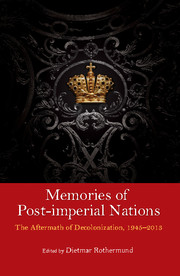Book contents
- Frontmatter
- Contents
- Preface
- Introduction
- 1 Memory of Empire in Britain: A Preliminary View
- 2 Ruptures and Dissonance: Post-colonial Migrations and the Remembrance of Colonialism in the Netherlands
- 3 A Distinctive Ugliness: Colonial Memory in Belgium
- 4 The Post-colonial Encounter in France
- 5 Ideologies of Exceptionality and the Legacies of Empire in Portugal
- 6 Post-colonial Italy: The Case of a Small and Belated Empire: From Strong Emotions to Bigger Problems
- 7 Post-imperial Japan in Transnational Perspective
- 8 Memories of Post-imperial Nations
- 9 A View from the Gallery: Perspective of a ‘Colonized’ on Post-imperial Memories
- Contributors
- Index
9 - A View from the Gallery: Perspective of a ‘Colonized’ on Post-imperial Memories
Published online by Cambridge University Press: 05 September 2015
- Frontmatter
- Contents
- Preface
- Introduction
- 1 Memory of Empire in Britain: A Preliminary View
- 2 Ruptures and Dissonance: Post-colonial Migrations and the Remembrance of Colonialism in the Netherlands
- 3 A Distinctive Ugliness: Colonial Memory in Belgium
- 4 The Post-colonial Encounter in France
- 5 Ideologies of Exceptionality and the Legacies of Empire in Portugal
- 6 Post-colonial Italy: The Case of a Small and Belated Empire: From Strong Emotions to Bigger Problems
- 7 Post-imperial Japan in Transnational Perspective
- 8 Memories of Post-imperial Nations
- 9 A View from the Gallery: Perspective of a ‘Colonized’ on Post-imperial Memories
- Contributors
- Index
Summary
Introduction
A view from the gallery is always different from one from within the arena. Having come from a non-imperial nation, rather, from a decolonized one, in this case, India, ‘the jewel in the crown’ for the mighty British Empire, it was a rich experience to listen as to how the post-imperial European nations and their lone Asian counterpart, Japan, looked back at their imperial past. Were these journeys to the past nostalgic, imbued with a sense of pride, or, were they mired with a sense of guilt, or bogged down with issues like immigrations from erstwhile colonies, the so-called ‘reverse colonization’? The tone of the discussions was appropriately set by Dietmar Rothermund in his introductory statement. He mentioned five critical points around which the deliberations should largely veer around. Those points were: (1) memories of imperial nation building; (2) the experience of decolonization; (3) the challenge of ‘repentance’; (4) the encounters with immigrants; and (5) the reconstruction of memories and the rebuilding of nations. Seven presentations followed those remarks in the span of two days from scholars belonging to seven erstwhile European and Asian imperial nations, namely, in order of their presentations, the United Kingdom, the Netherlands, Belgium France, Portugal, Italy and Japan. Their perspectives on ‘Memories of Post-Imperial Nations’ had to be different as their imperial and post-imperial experiences were different. For the same reason the discussants' remarks too differed from one another though there was one common factor – all discussants belonged to Germany with the lone exception of this author who was of course not a discussant on any particular chapter. That gave the latter the opportunity to say a few words at the concluding session of the conference in way of presenting his reflections on the discourse, which was immensely stimulated by comments and questions made during the Q&A sessions. The present chapter is an enlarged version of that oral presentation.
The chapter is divided into four sections. The first puts the rationale and texture of the deliberations in the context of memory research.
- Type
- Chapter
- Information
- Memories of Post-Imperial NationsThe Aftermath of Decolonization, 1945–2013, pp. 181 - 198Publisher: Cambridge University PressPrint publication year: 2015



